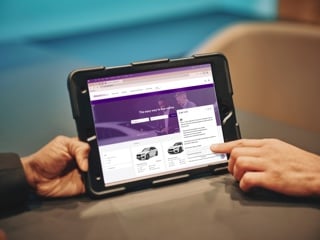The UK retail market is in the midst of a revolution, driven by a systematic shift in customer behaviour and buying habits.
Automotive retail is no different; profit margins are being squeezed as a result of changes in the landscape, from how we shop, to where what time and why.
More customers are shopping online than ever before and it appears don’t necessarily want to visit a traditional car dealership before they buy.
While it’s not as extreme as fashion or grocery shopping, car retailers are potentially seeing a change in the way people view ownership and how they shop for a new or used vehicle.
As such, blanket email marketing or using traditional communication channels to reach customers aren’t showing as much return as they once did.
AI opportunity
To keep up with the changing world of consumer behaviour, we suggest, retailers need to adjust.
New ways of shopping, coupled with advanced digital technologies, are generating data, and lots of it.
This data can be harnessed through technologies, such as artificial intelligence (AI), to generate meaningful innovations and increase revenue.
When we talk about AI for automotive, we think about the new ways it’s enabling us to get around – driverless cars and other autonomous vehicles – but it also has the potential to transform automotive supply chains completely.
Machine learning, a mechanism to achieve AI, is making production lines smarter and, therefore, more efficient when it comes to productivity and cost savings.
AI is also impacting communications and marketing, allowing car retailers to know and understand their customers better than ever before, giving them a competitive advantage.
Operational vs strategic benefits
There are two main areas of influence for AI in automotive retailing, the first of which looks at the operational or tactical side of the business.
Thinking about the significant shift in customer behaviour and purchasing habits, AI can put the right information, products and services in front of the right people, in the right way, at the right time.
This is done by analysing customer behaviour across all communication channels and using that insight to make meaningful interventions.
How do they move through a website, for instance, and are they showing potential to buy?
Not only does taking these outputs and translating them into tailored communications increase the chance of a sale, but it also improves customer retention and business reputation.
That’s what we did with Tyres on the Drive. Using the Peak AI System, we were able to identify the customers that needed new tyres due to unsafe tread depths with 75% accuracy in any given month and lead them to make a purchase.
This information can also be used to improve the on-site experience for customers, as well as influence how call centres operate.
The Peak AI System is also used by online motoring retailer Regitto predict when its 2.5 million users are most likely to change their vehicle, enabling the company to send those customers relevant communications.
This use of AI increased Regit’s sales by 27% in just 30 days and reduced operational costs by 35% by enabling them to staff their call centre at the optimal times of day, when sales are most likely.
The impact of AI on the automotive retail supply chain is also evident through the relationship with the car manufacturer.
By monitoring what demand looks like at any given time, retailers can have better-informed conversations with manufacturers and therefore manage stock distribution to where that demand is.
On a strategic level, becoming AI-driven can help automotive retailers better understand their business and the value drivers within it.
In such a turbulent environment, different business models are continually emerging, and AI can help to adapt to those ways of operating.
It can help to predict where the business will be in six or 12 months’ time, for example, and make recommendations on what you need to do to get there.
From our work with ASE Global, we can now use AI to predict dealer profitability (net profit as a percentage of turnover) with a proven high degree of accuracy over the next 12 months.
We have been able been able to determine the key business drivers within each ASE Global dealership, which contributes to profitability.
Future-gazing
Looking ahead, the place for AI in automotive will continue to become more widespread.
The sector certainly has some catching up to do within the wider retailer landscape, but automotive retailers can’t afford to miss out on the opportunity that becoming AI-driven presents.
What currently differentiates a business from its competitors, the technology, will become a necessity in the near future.
By recognising the importance of monitoring customer habits and using AI to tailor their approach, they are more likely to make that all-important sale.
In an already competitive environment, the earlier businesses get on the AI journey, the quicker they will see return and stay ahead of the curve in future.
Author: Will Dutton, head of customer success at Peak



















Login to comment
Comments
No comments have been made yet.